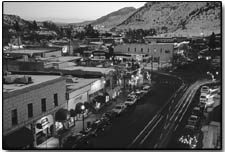 |
| Durango continues to deal
with a long-standing sexual assault problem. The Rape Intervention
Team has seen an increase in calls in recent years, which
could actually be a positive sign./Photo by Todd Newcomer. |
This week, in honor of Sexual Assault Awareness
Month, hundreds of local women and men will march together in
protest of rape at FLC’s third annual Take Back the Night
march and rally.
Take Back the Night is an international event that is traditionally
held in local communities in April, with the goal of taking
a stand against violence and making the night safe for everyone.
While many people believe that Durango is “safe,”
it is impossible to accurately gauge the prevalence of sexual
assaults in this community, mainly because only a small percentage
of rapes are reported.
On the national level, only 16 percent of sexual assaults are
reported, which makes rape the most under-reported felony crime
in the nation, according to literature from Durango’s
Rape Intervention Team.
According to Liane Jollon, executive director of RIT, calls
to the group’s hotline have increased 20 percent each
year for the past few years. However, she said this could be
a positive sign that more people are accessing services, and
not that the number of rapes is increasing. In 2002, RIT had
248 contacts with victims.
“Victims feel tremendous barriers to reporting (rape),
and wonder ‘Will I be believed?’” Jollon said.
“So, if someone discloses to you that they’ve been
sexually assaulted, the most important thing is to believe him
or her.”
Jollon said RIT, which has been supporting survivors of sexual
assault for 26 years with a 24-hour hotline staffed by volunteers,
among other things, has refocused its prevention work on the
fastest growing group of callers to its hotline: teenagers.
Victims ages 13 to 18 – and their parents – now
constitute a full third of hotline callers, Jollon said.
 |
| Hundreds of local residents will take
to the streets on the evening of April 10 in honor of Durango’s
Third Annual Take Back the Night march and rally. /Photo
by Todd Newcomer. |
“If a third of our callers are teenagers, our community
is clearly demonstrating a need,” Jollon said.
Adrian Sagan, RIT prevention services coordinator, was hired
specifically to educate teens about sexual assaults. He makes
presentations at Durango High School and Ignacio High School
health classes, where students learn their options in a variety
of scenarios.
“We try to make it as interactive as possible,”
Sagan said.
The next-largest segment of hotline callers is 18- to 24-year-olds,
Jollon said, adding that callers in the group aren’t necessarily
Fort Lewis College students. The RIT hotline averages one call
a month from an FLC student, she said.
The FLC campus police also average about a call a month from
a student who has been sexually assaulted, said Arnold Trujillo,
campus police chief.
“I know that there’s more going on than is reported,”
Trujillo said.
Jollon said one reason so few sexual assaults are reported
is that if a woman or man is assaulted by someone they know
– which is extremely common – it can be even more
difficult to seek help. Jollon said that 85 percent of perpetrators
are “known offenders,” such as a friend, an acquaintance,
a neighbor, a coworker, a family member, a boyfriend, a husband,
or an ex.
“While it does happen that someone could be raped on
a hiking trail, jogging, in a parking lot, by a stranger in
a dark alley85statistically, it’s least likely to happen
that way,” Jollon said.
About 70 percent of calls to RIT involve an assault by an acquaintance,
while relatives and spouses form the next largest group.
“The trauma experienced by the victim is magnified (when
they know the perpetrator) because they were let down by someone
they trusted and possibly cared about, which leads to their
shame, embarrassment, confusion and humiliation, which in turn
discourages or ‘uninspires’ them from seeking help
or reporting the crime,” Jollon said.
Now a RIT advocate, Samantha Christenson said she felt isolated
and without many options when she was raped by her husband several
years ago.
Christenson was only 18 years old when she got married in Iowa.
She soon found that she and her new husband “were like
oil and water,” and he became violent toward her. But
she didn’t feel she had many alternatives to the marriage.
“I was young and sheltered, from an Irish Catholic family,”
Christenson said. “Spouses don’t leave.”
Then one day during a fight, her husband accused her of not
fulfilling her “wifely duties” and raped her. She
left him and moved to Denver, where she consulted a police officer
who suggested she buy a gun instead of pressing charges.
“I never should have been advised that by a police officer
– that’s why women need to be educated,” Christenson
said. “I think if I had been a better-educated woman,
I probably would have made different decisions.”
Christenson said it wasn’t until moving to Durango that
she began to realize that even in a relationship, “your
body still belongs to you.”
“If you say no, you say no, and that’s always the
bottom line,” Christenson said.
Now 25, Christenson has been an RIT hotline advocate for the
past 3 years. It has been therapeutic volunteering on the 24-hour
hotline, she said, because it gives “power and control
back to the survivor, which to me is very important.”
“One thing that really helped me heal was coming to Durango
and finding a community of people who legitimately care,”
she said.
Christenson said women or men who have been sexually assaulted
should not hesitate to call the RIT hotline.
“You have choices – don’t be afraid to reach
out,” Christenson said. “It’s confidential,
and there are people who really care.”
The RIT hotline can be reached at 247-5400 or
www. rapeintervention.org.

